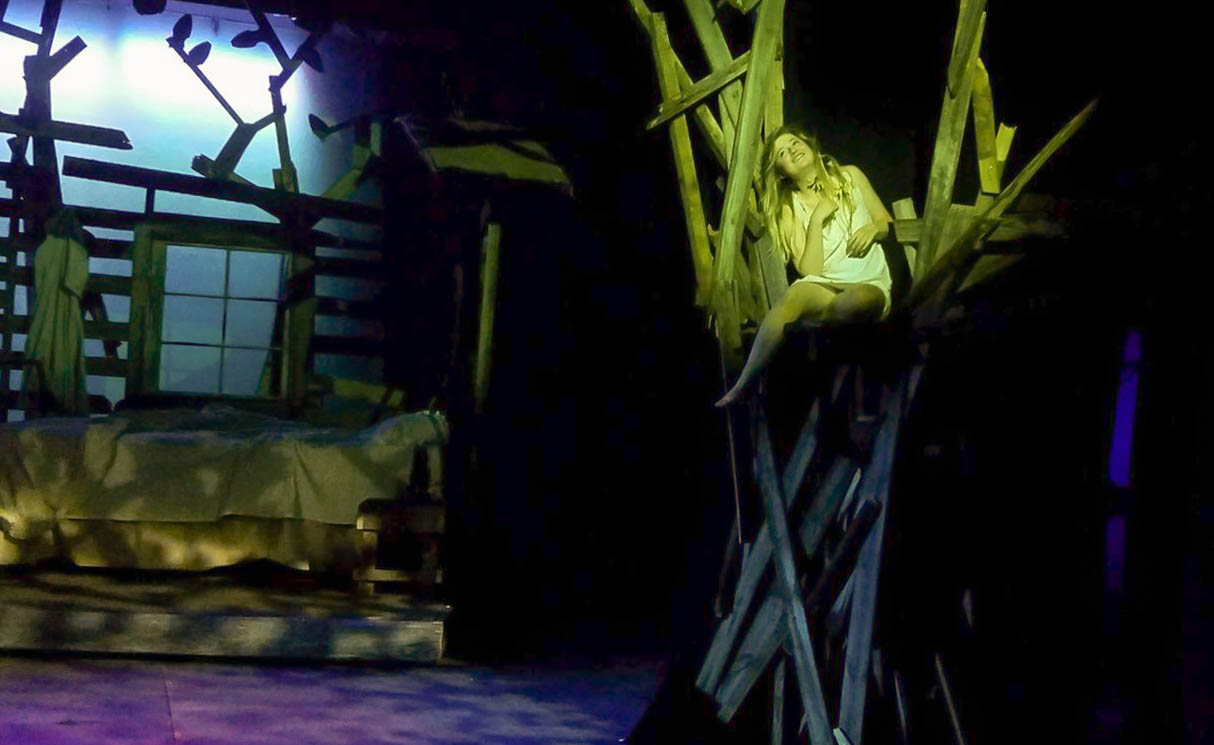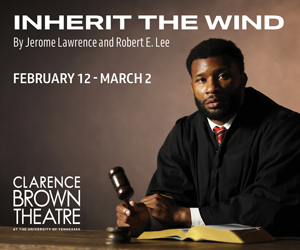The hypnotic drone of cicadas smoothed over by a warm Appalachian mountain breeze; sun-dappled fields of tall grass that give way to dark, forbidding woods; a simple cabin of rough-hewn boards inhabited by two sisters at the mercy of their own imagination, longing, and desires … Those are the atmospheric underpinnings of Deborah Pryor’s The Love Talker, which opened Friday evening at Flying Anvil Theatre. However, the atmosphere is only the beginning of this tale in which the two sisters fall prey to a malevolent spirit that inhabits those dark woods. This is a spirit, though, whose weapon is not a sharp knife or even a dull axe, but seduction that lures the vulnerable into giving up life and civilized behavior for a bit of ecstasy.
Director Jayne Morgan has given the play a satisfyingly realistic ebb and flow of energy and movement that carries the premise along on a conventional, horror-story level. But masterfully, she also suggests that things are maybe not what they seem, and that the audience should also consider that metaphor and allegory may be lurking just beneath the surface.
The plot itself is relatively simple. Two orphaned sisters are living an isolated, and apparently lonely, life in an Appalachian cabin. The elder sister, Bun, cares for the teenager Gowdie, who is drifting away from the responsibilities of existence and falls under the charm and seduction of a mysterious, supernatural figure known only as the Love Talker. Bun’s warning to Gowdie that their mother fell for the charms of the same spirit, causing her madness and death, falls on deaf ears.
Also inhabiting the woods is a supernatural wild woman called the Redhead who urges Gowdie toward the wild side. Bun manages to capture the Redhead, learning the Love Talker’s real name, which, when recited three times in a spell, can drive the spirit away. However, things don’t go as planned.
In addition to Morgan’s careful treading of the line between reality and fantasy, her casting of Carolyn Corley as Bun and Emily Cullum as Gowdie was equally masterful. Corley’s Bun is a marvelously sculpted image of an older sister, worn down, cross, and angular from the responsibility of caring for a younger sibling. Cullum offers up a wonderfully naive Gowdie, a blend of innocent childlike defiance and adult-like passion.
The character of the Love Talker, seen only in half shadows and eerie, saturated colors of light, was taken by JD Sizemore. Although Sizemore’s character actually has few lines, The Love Talker seems to glide across the stage, rather than walk, and looks away from the faces of others with such amused disdain as if that might dilute his power over them. Margy Ragsdale gave the character of The Redhead a magnificent aura of attitude and body language, punctuated by an intriguing delivery style.
Integral to the atmosphere of The Love Talker were Mike Ponder’s dreamlike sound effects of insects and other mysterious mountain noises and Jon Chemay’s lighting that had to run the gamut from reality to fantasy. John Ferguson’s marvelous set of wood slats, creaky floors, and stylized forest, also underscored Morgan’s open-ended philosophical premise.
The Love Talker is the third production of Flying Anvil Theatre in its new theatre space in Rocky Hill. If you’ve hesitated to make the drive out Northshore, unsure of what may await you, I can assure you that this compelling production is worth the drive. Catch The Love Talker during its run on Wednesdays through Sundays through November 5.
Flying Anvil Theatre
1300 Rocky Hill Road Off Northshore Drive
Photo courtesy of Stan Trew and Flying Anvil Theatre







Thanks, Alan, this means a lot!
Jayne
Your review is not only beautifully expressed, but deeply understanding of the play’s execution and underlying possibilities. Thank you for this depth and goodness! It’s not often that local theatre produces work so locally set and relevant–and wonderfully crafted. Come one, come all to Flying Anvil Theatre’s The Love Talker!